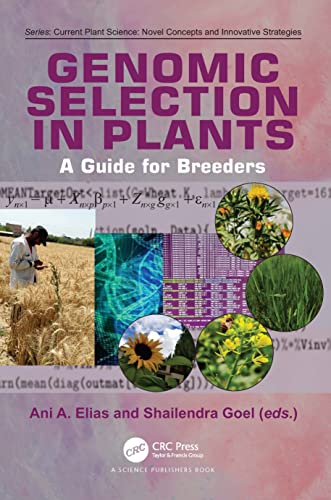Artículos relacionados a Genomic Selection in Plants: A Guide for Breeders (Current...

Sinopsis
Genomic selection (GS) is a promising tool in the field of breeding especially in the era where genomic data is becoming cheaper. But its potential has been understated due to the limited adaptation in various crops.
"Sinopsis" puede pertenecer a otra edición de este libro.
Acerca del autor
Ani A. Elias is a recipient of the prestigious Ramalingaswami fellowship and is presently working at the Institute of Forest Genetics and Tree Breeding, India. She received her Ph.D. from Purdue University, USA with a specialization in statistical genetics and gained postdoctoral experience in genomic selection (GS) from Cornell University, USA. She has worked on GS and other genomic prediction models in maize, sorghum, cassava, and safflower both in the private and public sectors.
Shailendra Goel is a professor at the Department of Botany, University of Delhi from where he received his Ph.D. He is involved in genetics and genomics studies of complex and important traits in various crops. He has developed a comprehensive breeding program on safflower, a promising native oil seed crop from India. He has a prolific research career with publications in major journals, and editorial services to publishers such as Oxford, Springer, and Elsevier.
"Sobre este título" puede pertenecer a otra edición de este libro.
EUR 17,17 gastos de envío desde Estados Unidos de America a España
Destinos, gastos y plazos de envíoComprar nuevo
Ver este artículoEUR 7,02 gastos de envío desde Reino Unido a España
Destinos, gastos y plazos de envíoResultados de la búsqueda para Genomic Selection in Plants: A Guide for Breeders (Current...
Genomic Selection in Plants: A Guide for Breeders
Librería: THE SAINT BOOKSTORE, Southport, Reino Unido
Paperback / softback. Condición: New. New copy - Usually dispatched within 4 working days. 420. Nº de ref. del artículo: B9781032103693
Cantidad disponible: 1 disponibles
Genomic Selection in Plants: A Guide for Breeders (Current Plant Science)
Librería: Ria Christie Collections, Uxbridge, Reino Unido
Condición: New. In. Nº de ref. del artículo: ria9781032103693_new
Cantidad disponible: Más de 20 disponibles
Genomic Selection in Plants: A Guide for Breeders
Impresión bajo demandaLibrería: Revaluation Books, Exeter, Reino Unido
Paperback. Condición: Brand New. 232 pages. 9.18x6.12x9.21 inches. In Stock. This item is printed on demand. Nº de ref. del artículo: __1032103698
Cantidad disponible: 1 disponibles
Genomic Selection in Plants : A Guide for Breeders
Librería: GreatBookPricesUK, Woodford Green, Reino Unido
Condición: New. Nº de ref. del artículo: 48137430-n
Cantidad disponible: Más de 20 disponibles
Genomic Selection in Plants : A Guide for Breeders
Librería: GreatBookPrices, Columbia, MD, Estados Unidos de America
Condición: As New. Unread book in perfect condition. Nº de ref. del artículo: 48137430
Cantidad disponible: Más de 20 disponibles
Genomic Selection in Plants : A Guide for Breeders
Librería: GreatBookPrices, Columbia, MD, Estados Unidos de America
Condición: New. Nº de ref. del artículo: 48137430-n
Cantidad disponible: Más de 20 disponibles
Genomic Selection in Plants: A Guide for Breeders
Librería: THE SAINT BOOKSTORE, Southport, Reino Unido
Paperback / softback. Condición: New. This item is printed on demand. New copy - Usually dispatched within 5-9 working days. Nº de ref. del artículo: C9781032103693
Cantidad disponible: Más de 20 disponibles
Genomic Selection in Plants : A Guide for Breeders
Librería: GreatBookPricesUK, Woodford Green, Reino Unido
Condición: As New. Unread book in perfect condition. Nº de ref. del artículo: 48137430
Cantidad disponible: Más de 20 disponibles
Genomic Selection in Plants (Paperback)
Librería: AussieBookSeller, Truganina, VIC, Australia
Paperback. Condición: new. Paperback. Genomic selection (GS) is a promising tool in the field of breeding especially in the era where genomic data is becoming cheaper. The potential of this tool has not been realized due to its limited adaptation in various crops. Marker Assisted Selection (MAS) has been the method of choice for plant breeders while using the genomic information in the breeding pipeline. MAS, however, fails to capture vital minor gene effects while focusing only on the major genes, which is not ideal for breeding advancement especially for quantitative traits such as yield. The main aim of statistical methodologies coming under the umbrella of GS on using the whole genome information is to predict potential candidates for breeding advancement while optimizing the use of resources such as land, manpower, and most importantly time. Lack of proper understanding of the methods and their applications is one of the reasons why breeders shy away from this tool. The book is meant for biologists, especially breeders, and provides a comprehensive idea of the statistical methodologies used in GS, guidance on the choice of models, and design of datasets. The book also encourages the readers to adopt GS by demonstrating the current scenarios of these models in some of the important crops among oilseeds, vegetables, legumes, tuber crops, and cereals. For ease of implementation of GS, the book also provides hands-on scripts on GS data design and modeling in a popular open-source statistical program. Additionally, prospective in GS model development and thereby enhancement in crop improvement programs is discussed. Genomic selection (GS) is a promising tool in the field of breeding especially in the era where genomic data is becoming cheaper. But its potential has been understated due to the limited adaptation in various crops. Shipping may be from our Sydney, NSW warehouse or from our UK or US warehouse, depending on stock availability. Nº de ref. del artículo: 9781032103693
Cantidad disponible: 1 disponibles
Genomic Selection in Plants: A Guide for Breeders
Librería: Revaluation Books, Exeter, Reino Unido
Paperback. Condición: Brand New. 232 pages. 9.18x6.12x9.21 inches. In Stock. Nº de ref. del artículo: x-1032103698
Cantidad disponible: 2 disponibles

